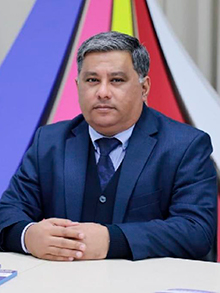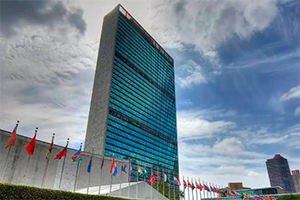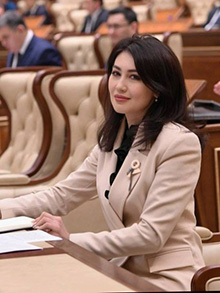
Assessment of poverty indicators in the Republic of Uzbekistan by the end of 2023  The CERR jointly with the Statistics Agency, assessed the level of monetary poverty in Uzbekistan. By the end of 2023, poverty in the country decreased by 3.1 percentage points. The experts explained how the poverty profile has changed and in which regions the incomes of the population have shown the greatest growth.
The CERR jointly with the Statistics Agency, assessed the level of monetary poverty in Uzbekistan. By the end of 2023, poverty in the country decreased by 3.1 percentage points. The experts explained how the poverty profile has changed and in which regions the incomes of the population have shown the greatest growth.
According to the results of the assessment of the Statistics Agency under the President of Uzbekistan, by the end of 2023, the poverty level in Uzbekistan has decreased to 11.0%.
READ MORE
- EGF Editor |
Published on EGF: 06.02.2024
| Security
-
Armenia and Azerbaijan Address Concerns Over Territorial Integrity  By Vasif HUSEYNOV, PhD, Head of Department, AIR Center, Adjunct Lecturer, ADA and Khazar Universities, Baku
By Vasif HUSEYNOV, PhD, Head of Department, AIR Center, Adjunct Lecturer, ADA and Khazar Universities, Baku
On January 19, Armenian Prime Minister Nikol Pashinyan called for a new constitution in a meeting with senior officials from the Armenian Ministry of Justice. Pashinyan asserted that Armenia needs “a new constitution, not constitutional changes,” adding that the new foundational document would make the country “more competitive and viable in the new geopolitical and regional environment” (Azatutyun.am, January 19). He highlighted that the new constitution would maintain the present parliamentary system and underscored “external security” and “internationally recognized sovereign territory” as the main issues to be addressed. Mutual respect for one another’s territorial integrity remains a sticking point in peace negotiations between Armenia and Azerbaijan. If Yerevan proceeds with Pashinyan’s proposal, the new constitution will eliminate certain hurdles to signing a peace treaty with Baku.
READ MORE
- EGF Editor |
Published on EGF: 30.01.2024
| Security
-
Baku wants an agreement with Armenia without mediators  By Vasif HUSEYNOV, PhD, Head of Department, AIR Center, Adjunct Lecturer, ADA and Khazar Universities, Baku
By Vasif HUSEYNOV, PhD, Head of Department, AIR Center, Adjunct Lecturer, ADA and Khazar Universities, Baku
On January 8, US Senior Adviser on Caucasus Negotiations Louis Bono visited Yerevan, engaging in discussions with local officials regarding the Armenia-Azerbaijan peace process. The Armenian side reported that one of the issues discussed during this visit was the organization of a meeting of the Armenian and Azerbaijani foreign ministers in Washington. Unlike his previous visits to the region, this trip omitted a visit to Baku, suggesting that it either wasn’t planned, which is unlikely, or that the Azerbaijani side was not open to receiving him. Recent developments between Baku and Yerevan, along with the evolving dynamics of mediator involvement, indicate that Azerbaijan has grown more cautious and sceptical about the role of third parties in the Armenia-Azerbaijan process. As a result, Azerbaijan has advocated for bilateral meetings between the two countries. Baku’s position is primarily related with the potential geopolitical fallout of the upcoming peace deal with Yerevan.
READ MORE
- EGF Editor |
Published on EGF: 23.01.2024
| Security
-
What Next in Armenia – Azerbaijan Negotiations  By Benyamin POGHOSYAN, PhD, Chairman, Center for Political and Economic Strategic Studies
By Benyamin POGHOSYAN, PhD, Chairman, Center for Political and Economic Strategic Studies
In the late months of 2022 and 2023 there were intensive discussions about the possible signature of the Armenia – Azerbaijan peace agreement. Both international mediators and facilitators, as well as representatives of Armenia and Azerbaijan were making statements that a peace agreement signature is within reach. As we enter 2024, discussions are underway about the potential signature of the Armenia – Azerbaijan agreement in 2024. The December 7, 2023, bilateral statement on the release of Prisoners of War and Armenia’s support of the Azerbaijani bid to host the COP29 in Baku gave more impetus to these hopes. Some believe that the military takeover of Nagorno Karabakh by Azerbaijan in September 2023 made this perspective more realistic, especially as the Armenian government agreed not to include anything on Nagorno Karabakh in the peace agreement.
READ MORE
- EGF Editor |
Published on EGF: 23.01.2024
| Security
-
Ensuring women's rights is an integral part of the State gender policy in Uzbekistan  Mahinora Mirkhamidova, associate professor of the department International law and Public law disciplines of the University of World Economy and Diplomacy
Mahinora Mirkhamidova, associate professor of the department International law and Public law disciplines of the University of World Economy and Diplomacy
Today over two-thirds of the world's countries are participants in the UN Convention on the Elimination of All Forms of Discrimination Against Women (CEDAW) adopted in 1979. Ensuring women's rights is one of the 17 Sustainable Development Goals, goal 5 specifically aims at “Achieving gender equality and empowering all women and girls.” The issues of ensuring women's rights are reflected in the constitutions of almost all countries, entrenched in their legislation, and hold a significant place in national development plans and strategies.
READ MORE
- EGF Editor |
Published on EGF: 16.01.2024
| Security
-
Proprietary rights will be guaranteed in Uzbekistan  Avazbek Kholbekov, expert of the Development Strategy Center
Avazbek Kholbekov, expert of the Development Strategy Center
Over the past five years in Uzbekistan, a number of laws have been adopted in our country to ensure the priority of private property and strengthen its legal protection.
Most importantly, based on the principle of "From Action Strategy to Development Strategy" there was adopted the "Development Strategy of New Uzbekistan for 2022-2026", as a logical continuation of Action Strategy. In the document, turning the principles of justice and the rule of law into the most basic and necessary condition for development in the country was defined as one of the most important directions. Several necessary objectives were envisaged for this.
READ MORE
- EGF Editor |
Published on EGF: 08.01.2024
| Security
-
The UN General Assembly unanimously adopted a resolution initiated by Uzbekistan on environmental challenges in Central Asia  Qodir Djuraev, MP, Legislative Chamber of the Oliy Majlis of the Republic of Uzbekistan
Qodir Djuraev, MP, Legislative Chamber of the Oliy Majlis of the Republic of Uzbekistan
The UN General Assembly unanimously adopted the resolution on "Central Asia in the face of environmental challenges: strengthening regional solidarity for the sake of sustainable development and prosperity".
The resolution initiated and proposed by Uzbekistan and unanimously adopted by the UN General Assembly highlights the pressing environmental challenges faced in Central Asia. This region, known for its diverse ecosystems and natural resources, has been grappling with various environmental issues that require immediate attention and joint collaborative efforts. The resolution serves as a significant step towards addressing these challenges and fostering sustainable development in the region.
READ MORE
- EGF Editor |
Published on EGF: 29.12.2023
| Security
-
Gender equality in the civil service of Uzbekistan  Farangiz Avazbekova, Chief inspector of the Agency for the Development of Public Service under the President of the Republic of Uzbekistan; Doctor of Philosophy (PhD) in Law
Farangiz Avazbekova, Chief inspector of the Agency for the Development of Public Service under the President of the Republic of Uzbekistan; Doctor of Philosophy (PhD) in Law
The social and political activity of women and their participation in public administration bodies in the process of making important decisions are crucial for the development of the country. Sociological research has shown that women’s high efficiency, rapid and persistent decision-making, responsiveness to job completion, and prompt provision of executive discipline allow them to perform their duties effectively in the civil service.
READ MORE
- EGF Editor |
Published on EGF: 18.12.2023
| Security
-
Strategic Abstention: The ‘Axis of Resistance’ Deliberate Inaction in Gaza
 By Fuad SHAHBAZOV, Baku-based independent regional security and defence analyst
By Fuad SHAHBAZOV, Baku-based independent regional security and defence analyst
Amid the escalating Gaza war, a striking absence marks the regional conflict landscape: the non-involvement of the ‘Axis of Resistance,’ including Iran and its proxies. Nearly six weeks into the war, these forces have consistently communicated their decision to remain on the sidelines. This inaction comes into sharp focus against the backdrop of Iran’s strategy to leverage non-state actors like Hezbollah and Hamas in its proxy warfare. While Hezbollah’s leader, Hassan Nasrallah, clarified their stance in a much-anticipated speech a month into the conflict, the impact of this abstention is profound. Israel, grappling with internal divisions and security vulnerabilities heightened by Hamas’s attacks, finds itself in a precarious position not seen in decades.
READ MORE
- EGF Editor |
Published on EGF: 05.12.2023
| Security
-
How the Hamas-Israel War Impacts the South Caucasus
 By Fuad SHAHBAZOV, Baku-based independent regional security and defence analyst
By Fuad SHAHBAZOV, Baku-based independent regional security and defence analyst
The war between Hamas and Israel war has triggered strong anti-Israel sentiments in the region and heightened fears of a broader conflict engulfing actors such as Egypt, Iran, Jordan, Lebanon, and Turkey. Worried that the conflict in Gaza could escalate into a regional confrontation, the US has dispatched two aircraft carrier strike groups within range, including additional troops and military advisors.
But alongside tough rhetoric, the violence in Gaza has renewed apparent pragmatism by important regional states such as Iran and Turkey. Turkish President Recep Tayyip Erdogan has openly slammed Israel's bombings of the Palestinian coastal enclave. On the other hand, Ankara has avoided issuing direct threats against Tel Aviv and, in an apparent unusual move, allegedly distanced itself from Hamas in the aftermath of the Palestinian movement’s surprise attack on Israel last month.
READ MORE
- EGF Editor |
Published on EGF: 28.11.2023
| Security
-
